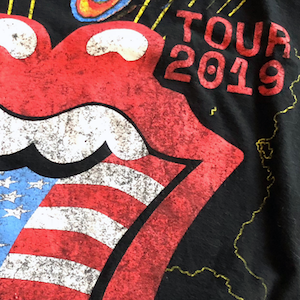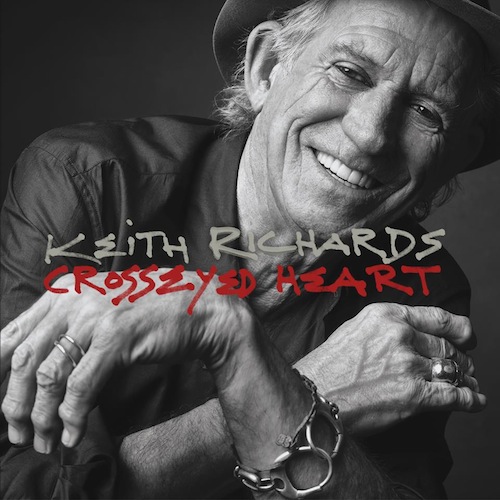Keith Richards reveled in the comfort of old favorites on 'Stone Alone'
By NICK TAVARES
STATIC and FEEDBACK Editor
Editor’s note: This is another installment in a series intended to shine a light on some loved recordings that are readily available, if not necessarily for sale.

For a certain segment of music fans, the sound of Keith Richards voice is unmistakable, and it’s not clear if that true voice is through a guitar tuned to G and stripped of its bottom string or in the bluesy rasp that comes from his throat. Stripping away the former, then, and replacing it with a solemn piano can serve to muddy that equation.
But a bootleg offers more insight rather than confusing questions on that matter of a true instrument. In separate sessions in the late 1970s and early 1980s, Richards found himself alone in a recording studio armed with a piano and a stable of songs that had kept him company since his earliest days. If they’re a departure from his typical style, they still serve to illustrate the inner groove that burns through the Rolling Stones’ best work and underscored the tender side of the musician.
The swashbuckling misfit who made a lifetime of defying death has always, for those in the know, been the keeper of a sensitive soul. It’s apparent enough on his solo turns within the Stones — ballads like “All About You” and “Slipping Away” certainly outnumber the raucous “Happy” and “Before They Make Me Run” — but just a little digging will reveal that he was the engine behind “Wild Horses” and “Salt of the Earth,” mournful acoustic numbers that had more in common with soul and country than the rock and roll deviant that reporters and visa officers assumed.
It’s that touch with the guitar that makes him such a compelling character. It’s apparent in any filmed interview where a guitar is present — and with Richards, those make up the majority — but also the interweaving style of the Rolling Stones’ music. The guitars were never flashy as much as they were intricate and inventive recasting of the blues and country in service of the song. It wasn’t about finding that searing solo as much as it was finding a voice. The voice was in those old songs and it would be in the songs the band would write.
Hearing Richards stripped of his signature instrument and hopping his way up and down the keyboard is jarring, but only slightly. While guitar occasionally pops up on the Toronto recordings, the rest are filled with Richards on just piano, summoning up the ghosts of the past and staring down a bleak future. These sessions were booked and recorded as Richards was facing serious drug charges in Canada, and he detailed the emotions surrounding that time in his autobiography, Life:
It was quite likely that jail time was on the cards. I was facing a probable two years, according to my lawyers. It was Stu [Ian Stewart] who suggested that I should use the waiting time to put down some tracks on my own — put something down to remember the man by. …
We just did all the country songs, nothing different from what I do any other night, but there was a certain poignancy about it because at that moment things looked a bit grim. I played the George Jones, Hoagy Carmichael, Fats Domino songs I’d played with Gram [Parsons]. Merle Haggard’s “Sing Me Back Home” is pretty poignant anyway. The warden is taking the prisoner down the hall to his execution.
Certainly, that vulnerability is present on these takes. Richards, in a reedy voice, is singing himself back home and taking solace in the music while facing the possible consequences of a life lived too close to the edge. As the prisoner in the song stands up to say goodbye to whatever was left of his life, Richards chose this moment to document his feelings as his life was crumbling and personified the man. If he was going to be put away, these would be his final moments on tape for some time, not intended for a commercial release but instead for those closest, a goodbye letter in the form of a reel-to-reel.
Of course, that doom scenario never materialized; the drug trafficking charge didn’t stick and Richards escaped without going to prison. His life as a musician was back on track, and the Stones were back on the road and recording, with Emotional Rescue and Tattoo You coming out in between massive tours.
It was just before the start of the 1981 tour in support of Tattoo You when Richards apparently popped into to Long View Farms, a studio in Brookfield, Mass., to hang out in a country setting and lay a few more songs down with the piano. Again, he went to the past, with new readings on “Sing Me Back Home” and “Apartment No. 9,” along with more upbeat takes like Jerry Lee Lewis’ “Whole Lotta Shakin’ Going On.” On that tune, Richards’ piano playing is definitely more subdued than Lewis’ wild playing, but it’s not hard to picture him laughing and sliding the piano bench out while he’s pounding it out.
And he’s certainly having fun with these songs. On a version of “Don’t,” a little late fumbling on the piano prompts Richards to laugh and tell the engineer, “fade it out early.” On that “Whole Lotta Shakin’” take, he laughs again and claims that it’s “just the short version.” And the glass of gin he’s clinking is audible on “Blue Monday.”
As in Toronto, these recordings find him exploring his roots outside of his comfort zone in search of another voice. It’s funny to think that such a prolific and influential artist would take such comfort in so many of these old songs, but it’s just another side of a music fan. While we’re swapping albums and finding our own identity on the songs we love, this bootleg is a reminder that the musicians do that, too.
Once in a while, Richards will sit down at the piano and sing some songs. Once in a while, he’ll record them and pass out a few tapes. And sometimes they get out, intrepid fans will get a peek into a more private side of a titan and start sharing those along with the songs they loved to begin with. They’ll provide comfort, as they did for the artist when he recorded them, and if not a perfect circle, a winding, intersecting path will come back to its origin and begin again, with everyone singing themselves and someone else back home. Richards seemingly does that every day. Everything he touches is his instrument.
E-mail Nick Tavares at nick@staticandfeedback.com
















